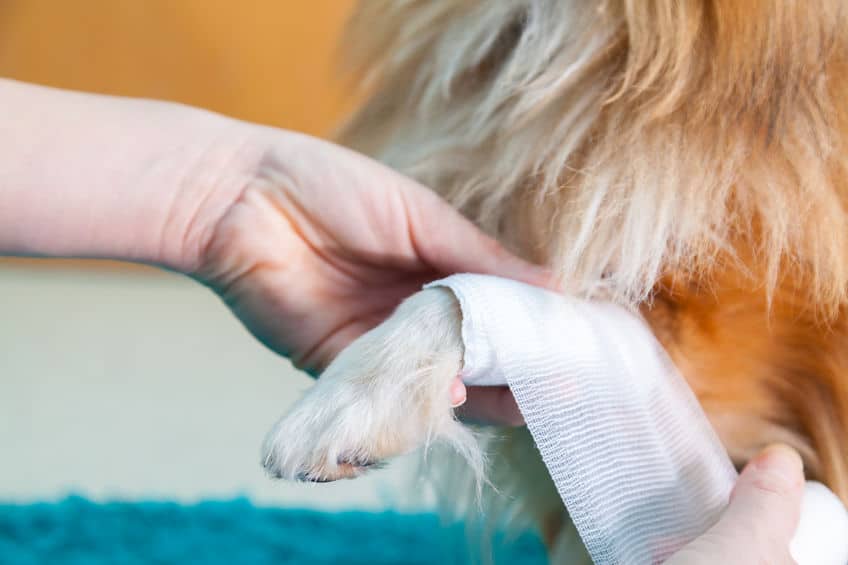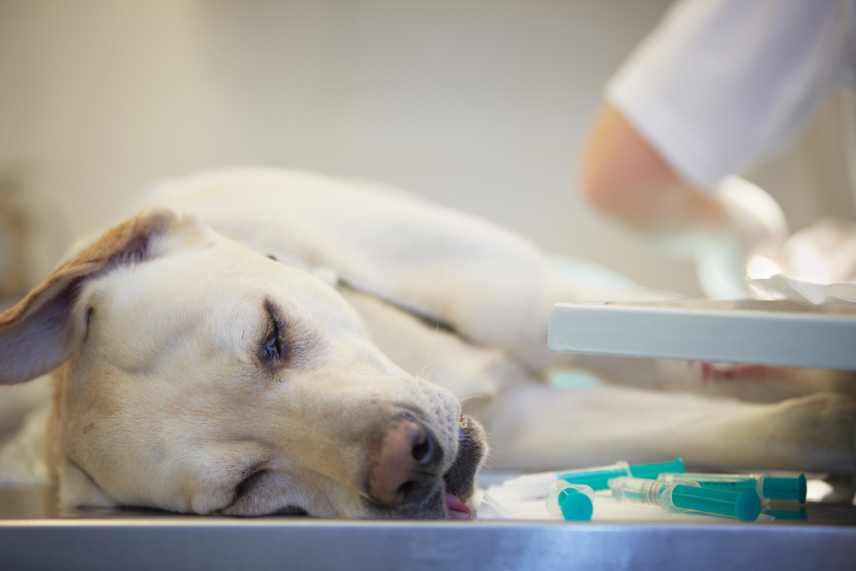Dog urinary tract infections (UTIs) can cause discomfort and distress for our canine companions. Recognizing the signs and treating these infections promptly is crucial for your pet’s health and well-being. Effective home remedies for dog UTIs include increasing water intake, adding cranberry supplements to their diet, and providing probiotics to support urinary tract health.
Pet owners can take proactive steps to manage and prevent UTIs in dogs. Natural remedies often offer a gentle, complementary approach to veterinary care. These methods can help alleviate symptoms and support the body’s natural defenses against infection.
Key Takeaways
- Increased water intake and cranberry supplements can support urinary tract health in dogs
- Natural remedies complement veterinary care for managing and preventing dog UTIs
- Monitoring symptoms and maintaining proper hygiene are essential for long-term urinary health

Understanding Dog Urinary Tract Infection
Urinary tract infections (UTIs) are common health issues in dogs. These infections affect the urinary system, including the bladder and urethra, causing discomfort and potential complications if left untreated.
Causes and Risk Factors
Bacterial infections are the primary cause of UTIs in dogs. E. coli is the most common culprit, but other bacteria can also be responsible. Female dogs are more susceptible due to their shorter urethras.
Factors that increase UTI risk include:
- Age (older dogs are more prone)
- Underlying health conditions (diabetes, Cushing’s disease)
- Weakened immune system
- Urinary tract abnormalities
- Bladder stones
Certain breeds may be predisposed to UTIs. Regular grooming and proper hygiene can help reduce the risk of infection.
Signs and Symptoms of UTI in Dogs
Recognizing UTI symptoms early is crucial for prompt treatment. Common signs include:
- Frequent urination
- Straining to urinate
- Blood in urine
- Cloudy or strong-smelling urine
- Accidents in house-trained dogs
- Licking the genital area excessively
- Fever
- Lethargy or decreased appetite
Some dogs may show only subtle changes in behavior. Pet owners should monitor their dog’s urination habits and overall well-being.
Diagnosis of Canine UTIs
Veterinarians use various methods to diagnose UTIs in dogs:
- Physical examination: Assessing overall health and checking for signs of discomfort.
- Urinalysis: Examining urine for bacteria, white blood cells, and other abnormalities.
- Urine culture: Identifying the specific bacteria causing the infection and determining antibiotic sensitivity.
- Imaging tests: X-rays or ultrasounds may be used to check for bladder stones or structural abnormalities.
Early diagnosis is essential to prevent complications and antibiotic resistance. Pet owners should consult a veterinarian if they suspect their dog has a UTI.
Immediate Care for UTIs
Swift action is crucial when addressing urinary tract infections in dogs. Proper care can alleviate discomfort and prevent complications.
When to See a Veterinarian
Persistent symptoms or severe discomfort warrant immediate veterinary attention. Signs like blood in urine, excessive straining, or fever indicate a need for professional care. Veterinarians can perform urinalysis and cultures to confirm the infection’s presence and severity.
Senior dogs or those with underlying health conditions may require urgent medical intervention. Untreated UTIs can lead to kidney infections or other serious complications.
The Role of Prescription Medications
Antibiotics are often the primary treatment for canine UTIs. Veterinarians select appropriate medications based on the infection’s severity and the dog’s health status. Common antibiotics include amoxicillin, cephalexin, or enrofloxacin.
It’s crucial to complete the entire course of antibiotics as prescribed. Stopping treatment prematurely can lead to antibiotic resistance or recurrence of the infection.
Pain relief medications may be prescribed to manage discomfort associated with bladder inflammation.
Preliminary Home Interventions
Increasing water intake is essential for flushing out bacteria. Consider adding low-sodium broth to water or using a pet fountain to encourage drinking.
A temporary switch to a bland, easily digestible diet can support the dog’s immune system. Boiled chicken and rice or prescription urinary diets may be beneficial.
Frequent bathroom breaks help prevent urine retention and reduce bacterial growth. Aim for walks every 2-3 hours during waking hours.
Cranberry supplements, when approved by a veterinarian, may help prevent bacteria from adhering to the bladder wall. However, they should not replace prescribed treatments.
Rest is important for recovery. Limit strenuous activities and provide a comfortable, stress-free environment for the dog to recuperate.
Natural Remedies for UTIs
Several natural remedies may help alleviate symptoms and support urinary tract health in dogs with UTIs. These options include cranberry supplements, herbal treatments, and other beneficial supplements.
Cranberry Supplements
Cranberry supplements are a popular natural remedy for UTIs in dogs. They contain proanthocyanidins, which can prevent bacteria from adhering to the urinary tract walls. These supplements come in various forms, including powders, tablets, and liquids.
Dosage depends on the dog’s size and the product’s concentration. It’s essential to choose supplements specifically formulated for dogs, as human products may contain harmful ingredients.
Cranberry supplements work best as a preventive measure or in conjunction with other treatments. They may reduce the frequency of recurring UTIs in some dogs.
Herbal Treatments and Their Effects
Several herbs show promise in supporting urinary tract health:
- Marshmallow Root: Soothes irritated urinary tract tissues
- Parsley Leaf: Acts as a natural diuretic
- Couch Grass: Supports kidney function
- Horsetail: Contains anti-inflammatory properties
- Bearberry: Has antimicrobial effects
These herbs can be administered as teas, tinctures, or capsules. Dosages vary based on the dog’s size and the specific herb. Always consult a veterinarian before starting any herbal treatment.
Some herbs may interact with medications or have side effects. Monitor your dog closely when introducing new herbs.
Other Supplements That May Help
D-Mannose is a naturally occurring sugar that can help prevent bacteria from sticking to the urinary tract walls. It’s available as a powder or in capsule form.
Methionine, an amino acid, may help acidify urine, creating an unfavorable environment for bacteria. It’s often included in urinary health supplements for dogs.
Probiotics support overall gut health and may indirectly benefit the urinary tract by promoting a healthy balance of bacteria.
Apple cider vinegar, added to drinking water, may help balance pH levels in the urinary tract. Use caution and dilute properly to avoid stomach upset.
Always consult a veterinarian before starting any new supplement regimen for your dog’s UTI.
Diet and General Care
Proper nutrition, hydration, and physical activity play crucial roles in preventing and managing canine urinary tract infections. These factors help maintain urinary health and boost the immune system.
Adjusting Your Dog’s Diet for UTI Prevention
A balanced diet tailored to urinary health can reduce UTI risks. Foods rich in antioxidants and omega-3 fatty acids support the immune system. Cranberries and blueberries may help prevent bacteria from adhering to the bladder wall.
Monitoring urine pH is essential. A pH between 6.0 and 6.5 is ideal for most dogs. Certain foods can influence urine acidity:
- Acidifying foods: Meats, eggs, cranberries
- Alkalizing foods: Most vegetables, some grains
Consult a veterinarian before making significant dietary changes. They may recommend specialized urinary diets to prevent bladder stones and maintain optimal urine pH levels.
Hydration and Frequent Urination
Adequate water intake is crucial for urinary tract health. It helps flush out bacteria and toxins. Ensure fresh, clean water is always available.
Encourage frequent urination to prevent bacterial buildup. Consider:
- More potty breaks throughout the day
- Using pee pads for indoor dogs
- Installing a doggy door for easy outdoor access
Monitor water consumption and urine output. Sudden changes may indicate health issues.
Regular Exercise and Weight Management
Regular physical activity promotes overall health and supports the urinary system. Exercise helps:
- Stimulate urine flow
- Maintain a healthy weight
- Boost the immune system
Aim for daily walks or play sessions tailored to your dog’s age and fitness level. Overweight dogs are more prone to UTIs, so maintain a healthy weight through proper diet and exercise.
Incorporate activities that encourage movement:
- Fetch
- Swimming
- Agility courses
Regular vet check-ups can help monitor weight and adjust exercise routines as needed.
Monitoring and Long-Term Management
Effective management of canine urinary tract infections requires ongoing attention and preventive measures. Regular monitoring, proactive care, and understanding potential complications are crucial for maintaining urinary tract health in dogs.
Tracking Symptoms and Response to Treatment
Keep a log of your dog’s urination habits, noting frequency, volume, and any signs of discomfort. Monitor for improvements or recurring symptoms after treatment. Watch for:
- Changes in urine color or odor
- Increased water consumption
- Accidents in the house
- Straining or pain while urinating
Regular urine tests can help detect early signs of infection. If symptoms persist or worsen, consult your veterinarian promptly.
Preventive Strategies for Recurrent UTIs
Implement preventive measures to reduce the risk of recurring urinary tract infections:
- Ensure constant access to fresh, clean water
- Encourage frequent urination through regular walks
- Maintain proper hygiene, especially around the genital area
- Consider cranberry supplements to promote urinary tract health
A balanced diet rich in antioxidants can support the immune system. Some veterinarians recommend probiotics to maintain a healthy urinary tract environment.
Understanding Potential Complications
Untreated or recurrent UTIs can lead to serious complications:
- Kidney infections
- Bladder stones
- Chronic urinary tract inflammation
Bacterial UTIs may become resistant to antibiotics if not properly treated. In male dogs, prostate infections can develop as a secondary issue.
Regular veterinary checkups are essential for early detection and prevention of these complications. Blood tests and imaging studies may be necessary to assess kidney function and check for bladder stones.
Conclusion and Preventative Measures
A holistic approach is essential for maintaining a dog’s urinary tract health. Providing a balanced diet rich in water content can support optimal urinary function. Fresh, clean water should always be available to encourage frequent urination.
Regular veterinary checkups are crucial for early detection of potential issues. Routine urinalysis can identify problems before they become severe. Prompt treatment of any underlying conditions is key to preventing recurrent infections.
Maintaining proper hygiene is important. Regular grooming, especially around the genital area, helps prevent bacteria from entering the urinary tract. For female dogs, wiping from front to back after urination can reduce the risk of infection.
Preventative measures:
- Encourage frequent urination
- Provide a balanced, moisture-rich diet
- Ensure access to fresh, clean water
- Schedule regular veterinary checkups
- Practice good hygiene and grooming
By implementing these strategies, pet owners can significantly reduce the likelihood of urinary tract infections in their dogs. Consistent care and attention to urinary health promote a happier, healthier canine companion.
Frequently Asked Questions
Dog owners often have questions about treating urinary tract infections at home. These FAQs cover common remedies, symptoms, and dietary considerations for managing UTIs in dogs.
What are effective home remedies for a dog’s urinary tract infection?
Several home remedies can help manage a dog’s UTI. Increasing water intake encourages frequent urination to flush out bacteria. Cranberry supplements may prevent bacteria from adhering to the bladder wall.
Probiotics support a healthy urinary tract by promoting good bacteria. D-mannose, a natural sugar, can help prevent bacteria from sticking to the urinary tract lining.
How can apple cider vinegar be used to treat a dog’s UTI?
Apple cider vinegar can be added to a dog’s water or food to help treat UTIs. It creates an acidic environment that inhibits bacterial growth. Mix 1 teaspoon of apple cider vinegar per 50 pounds of body weight into the dog’s water or food daily.
Monitor the dog’s reaction and consult a vet before long-term use. Some dogs may not tolerate the taste or acidity well.
What are the symptoms of a urinary tract infection in female dogs?
Female dogs with UTIs may exhibit frequent urination or attempts to urinate. They might strain while urinating or produce only small amounts. Blood in the urine is a common sign.
Unusual urine odor, accidents in the house, and excessive licking of the genital area can also indicate a UTI. Some dogs may show signs of discomfort or pain when urinating.
Are there any over-the-counter treatments for dog UTI?
Some OTC treatments can help manage dog UTIs. Urinary health supplements containing cranberry extract or D-mannose are available. These products may help prevent bacteria from adhering to the urinary tract.
Probiotic supplements designed for dogs can support urinary health. Always consult a veterinarian before using any OTC treatments, as they may not be suitable for all cases.
What dietary changes can help a dog with a urinary tract infection?
Increasing water intake is crucial for dogs with UTIs. Adding moisture to dry food or switching to wet food can boost hydration. Some veterinarians recommend a diet low in magnesium, phosphorus, and protein to reduce urine pH.
Incorporating foods rich in antioxidants and vitamin C, like blueberries, can support urinary health. Always consult a vet before making significant dietary changes.
Can a urinary tract infection in dogs resolve without medical intervention?
Mild UTIs in dogs may occasionally resolve without medical intervention. The dog’s immune system can sometimes fight off the infection if it’s caught early. Increased water intake and dietary changes might help in minor cases.
However, it’s crucial to monitor symptoms closely. If signs persist or worsen, veterinary care is necessary to prevent complications. Untreated UTIs can lead to more serious kidney infections.
Recognizing Fever in Dogs: Key Signs and What to Do

Dogs can develop fevers much like humans, but it can be tricky for owners to detect. Since dogs don’t sweat to cool down like people do, it’s essential for pet parents to be alert to other warning signs.
Spotting a fever in your dog means looking for small shifts in their behavior or physical state. Typical symptoms include tiredness, a lack of interest in food, shaking, and a warm nose or ears. Some dogs might also pant heavily, have red eyes, or a dry, hot nose. Catching these signs early allows owners to get the needed veterinary help right away.
Continue reading: Recognizing Fever in Dogs: Key Signs and What to Do
Do You Know What to Do If Your Dog Gets Sick And There is No Vet?

It’s a situation many dog owners never consider, while others hope they never face. But what if it happens?
What if your dog falls ill or gets injured, and you’re far from the nearest vet?
Would you know what to do?
Could you handle basic first aid for your dog if the need arises?
Whether it’s a bee sting, a sprained leg, or something more serious like a deep wound or broken bone, being prepared is key. If you frequently travel with your dog, hike in remote areas, or enjoy off-the-grid adventures, do you have a first aid kit specifically for your canine companion?
Continue reading: Do You Know What to Do If Your Dog Gets Sick And There is No Vet?
Common Misconceptions About Pet Insurance: Debunking Myths for Smart Pet Owners

Many pet owners have misconceptions about pet insurance, which can affect their ability to make informed decisions. It’s important to recognize that pet insurance can greatly ease the financial strain of unexpected vet bills, making it a valuable consideration for any responsible pet owner. This article aims to dispel common myths and offer clear insights into why having coverage for your pets is so important.
A common belief is that pet insurance is only necessary for older pets or those with pre-existing conditions. However, the truth is that pets of all ages can benefit, as it helps cover the costs of accidents, illnesses, and even routine care. With more owners seeking trustworthy information, it’s essential to clear up these misunderstandings.
Continue reading: Common Misconceptions About Pet Insurance

